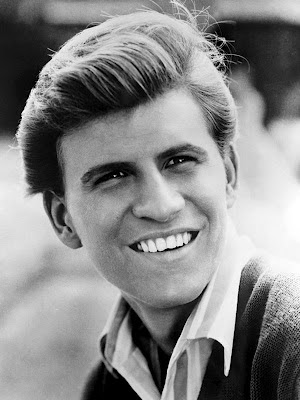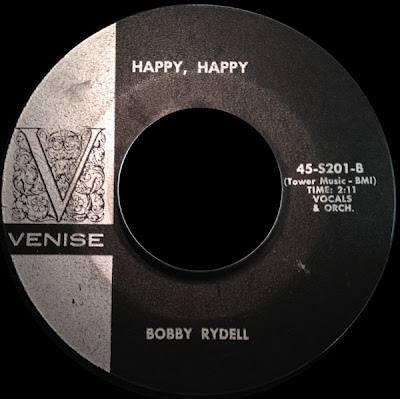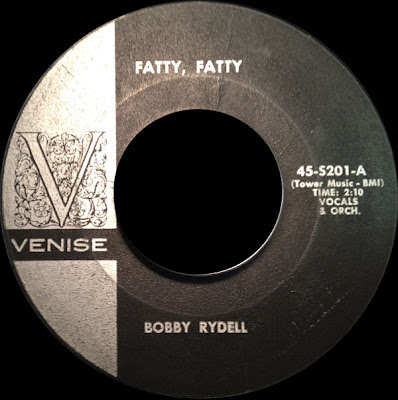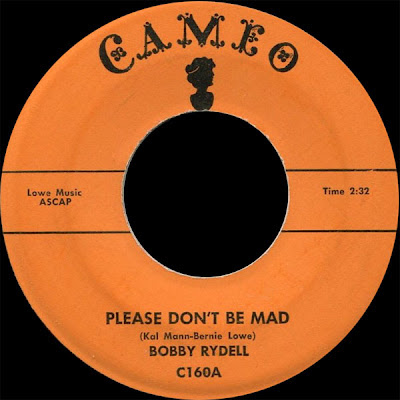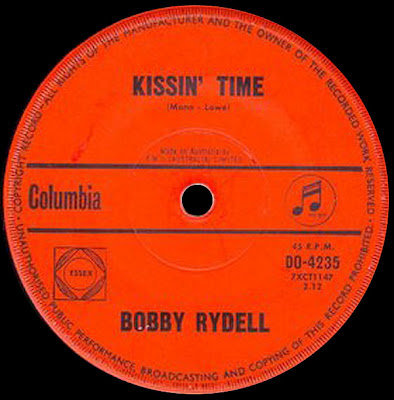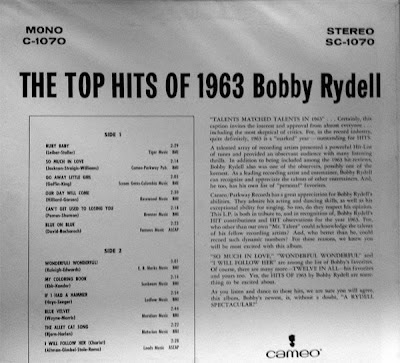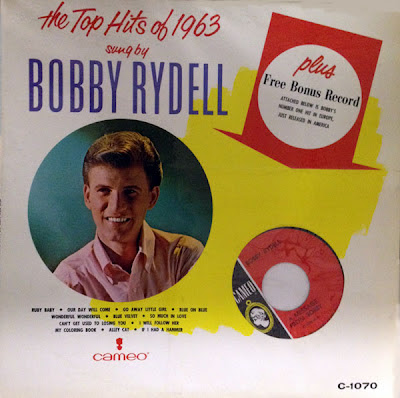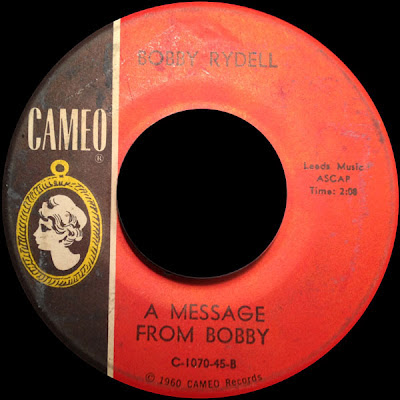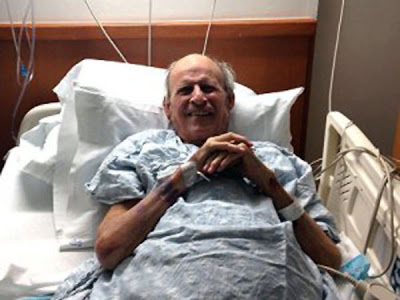Looking over my older posts it occurred to me that I frequently spotlight an artist who has recently passed away. Today I’m going in another direction. I’m going to talk about one who was probably days away from death, but is now on the road to recovery.
Bobby Rydell was born Robert Louis Ridarelli on 26 April 1942 in Philadelphia, Pennsylvania. He set out to be in show business before he even started school. Inspired by Gene Krupa, he was playing drums when he was only six. Just a year later, seven year old Bobby appeared on a TV talent show called Paul Whiteman’s TV Teen Club. He won first place and spent the next few years working with Whiteman, a 60 year old musician who headed up a very successful dance band in the 1920’s. He became a regular performer on that show. Along the way he changed his name, later joining some local bands in his home town. At local nightclubs around Philadelphia, young Bobby would entertain the guests with impersonations of famous TV stars, such as Johnny Ray, Louis Prima, and Milton Berle. While still attending Bishop Neumann High School in south Philly (now known as Neumann-Goretti), Bobby played drums with a group called Rocco And The Saints which also featured a young Frankie Avalon on trumpet. He and Frankie became best friends and are still close to this day. Another kid from the old neighborhood known simply as Fabian was another of Bobby’s friends.
He made his first solo record in 1958, a song called Happy Happy released on Venise 201:
I apologize for the inferior audio quality of the flip side of this record. My copy of this rare platter has a lot of scratches on both sides, but much more on this side. It’s a fairly obnoxious novelty called Fatty Fatty:
Happy Happy was issued again in 1958 on Veko 731 with a different song, Dream Age, on the flip side:
Neither of these records made the national charts, but they did earn Bobby a contract with Kal Mann and Bernie Lowe’s Cameo records in Philadelphia.
His first single on that label, Please Don’t Be Mad backed with Makin’ Time, was issued in the summer of 1959 on Cameo 160. Both songs escaped the charts, despite the fact that the topside was an awesome group record:
Bobby followed this up with a couple more Teenage Idol attempts, For You For You backed with All I Want Is You, on Cameo 164. He finally landed a hit with his next record, Kissin’ Time (USA), which went to #11 in June 1959.
Bobby toured Australia a year later with The Everly Brothers, Marv Johnson, The Crickets, The Champs, and Billy “Crash” Craddock. For the tour, he recorded a different version of Kissin’ Time for the Australian market. The original version never charted Down Under, but with the new lyrics it climbed to #7 there in November 1961. This version was never released anywhere else. Here’s Kissin’ Time (Australia Way) on Columbia 4235:
Here’s an interesting bit of Bobby Rydell trivia for you. While Paul McCartney and John Lennon were sitting on twin beds in a hotel writing She Loves You in May 1963, Bobby Rydell’s last big hit, Forget Him, was a #13 hit in England, but it hadn’t caught on yet in the states. They liked the way the backing chorus would “answer” Bobby in that song and wanted to do the same thing in She Loves You. The idea was for Paul and John to sing “She Loves You” followed by everyone singing “Yeah Yeah” immediately afterward. After trying it that way, they decided it wasn’t a very good idea and a couple hours later had changed it to the smash hit everyone knows.
Bobby recorded a fun “answer record” for his 1963 album, Top Hits Of 1963. It’s actually a cover of a song that was first recorded as an instrumental called Chariot by Franck Pourcel in 1961. Lyrics were first added in 1962, turning it into a European hit for Petula Clark called Chariot, which she sung in French. She also recorded a German version called Cheerio. You probably know the song best as I Will Follow Him by Little Peggy March, which became a #1 hit on Billboard’s Hot 100 in January 1963. Bobby’s cover changes the lyrics again, very slightly, so he could sing it from a male perspective.
Here’s I Will Follow Her by Bobby Rydell on Cameo LP 1070 from 1963:
Here’s the original French version, Chariot by Petula Clark on Vogue EP 8000 from 1962:
And here’s the German version, Cheerio:
While we’re on the subject, here’s Little Peggy March singing I Will Follow Him in perfect Japanese:
Ricky Nelson took a different approach when he sang the song on TV as I Will Follow You:
Nearly all the hits issued on the Cameo-Parkway labels featured the same backing musicians led by Dave Appell, who liked to use up to four saxophones on his rock and roll sessions. Blowing those tenor horns were Buddy Savitt, George Young, and Fred Nuzzolillo (using the name Dan Dailey). The guitar work was handled by Dave himself, or Joe Renzetti. Bob McGraw or Joe Macho played bass. At the keyboards you’d hear Fred Bender or Roy Straigis, although co-owner Bernie Lowe would take over for Charlie Gracie’s recordings. Ellis Tollin or Bobby Gregg worked the drums.
Here’s another interesting bit of trivia about Bobby Rydell. Did you know that, despite putting more than a couple dozen songs on the charts, he never had a number one hit on Billboard’s Hot 100? Nor did he score a chart-topper in any other part of the world. It’s true. His biggest hit, Wild One, only peaked at #2 in February 1960. That’s amazing when you consider that he placed 19 hits in the Top 30 from 1959 to 1964, many of which became million-sellers.
This next piece comes from a very strange 45 that was actually issued as a bonus record in the same 1963 album that included I Will Follow Her. One side of this record featured the song Forget Him, which at the time of this album’s release had been a #13 hit in England in May and June of 1963. The song would become a #4 smash hit for Bobby in the states in late December 1963 and early January 1964. But it’s the other side of this record that’s most interesting. This is called A Message From Bobby, and it features Bobby just talking about what was going on in his life at the time. It’s a wonderful glimpse into the past, and into the world of rock and roll from the perspective of a true Teenage Idol.
Here’s A Message From Bobby by Bobby Rydell on Cameo 1070 from 1963:
Here’s one more interesting YouTube clip:
In March 2010, Bobby, who suffers from diabetes, missed a show because he wasn’t feeling well. Bobby was forced to cancel his Australian tour this year when his health problems suddenly became much more serious. He was in urgent need of a new liver and kidney. In fact, his doctor told him he probably had less than a month to live. Just six weeks ago, Bobby underwent a 20-hour double organ transplant at Thomas Jefferson University Hospital in Philadelphia. During his hospital stay Bobby’s old friend, Frankie Avalon, called to let him know that he’d gone to church and prayed for him. He’s back home now with his second wife Linda Hoffman, who is also a nurse, and recovering very nicely. He met his first wife, Camille Quattrone, in 1968 and they had two children together. They were still married when Camille died of cancer in 2003. He married Linda on 17 January 2009. Bobby and his doctor will work together to raise awareness of the critical need for organ donors. For updates, check out his official website at http://www.BobbyRydell.com.
There are nearly one hundred Bobby Rydell songs playing right now on MusicMaster Oldies. This includes his duets with Chubby Checker and the duet he sang with Ann-Margret when he starred in the movie Bye Bye Birdie.

